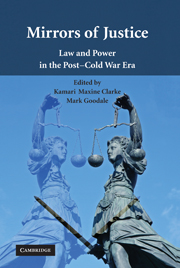Book contents
- Frontmatter
- Contents
- Editor Biographies
- Contributors
- Acknowledgments
- Introduction: Understanding the Multiplicity of Justice
- 1 Beyond Compliance: Toward an Anthropological Understanding of International Justice
- PART I JUSTICE AND THE GEOGRAPHIES OF INTERNATIONAL LAW
- 2 Postcolonial Denial: Why the European Court of Human Rights Finds It So Difficult to Acknowledge Racism
- 3 Proleptic Justice: The Threat of Investigation as a Deterrent to Human Rights Abuses in Côte d'Ivoire
- 4 Global Governmentality: The Case of Transnational Adoption
- 5 Implementing the International Criminal Court Treaty in Africa: The Role of Nongovernmental Organizations and Government Agencies in Constitutional Reform
- 6 Measuring Justice: Internal Conflict over the World Bank's Empirical Approach to Human Rights
- PART II JUSTICE, POWER, AND NARRATIVES OF EVERYDAY LIFE
- PART III JUSTICE, MEMORY, AND THE POLITICS OF HISTORY
- Epilogue: The Words We Use: Justice, Human Rights, and the Sense of Injustice
- Index
- References
4 - Global Governmentality: The Case of Transnational Adoption
Published online by Cambridge University Press: 25 January 2010
- Frontmatter
- Contents
- Editor Biographies
- Contributors
- Acknowledgments
- Introduction: Understanding the Multiplicity of Justice
- 1 Beyond Compliance: Toward an Anthropological Understanding of International Justice
- PART I JUSTICE AND THE GEOGRAPHIES OF INTERNATIONAL LAW
- 2 Postcolonial Denial: Why the European Court of Human Rights Finds It So Difficult to Acknowledge Racism
- 3 Proleptic Justice: The Threat of Investigation as a Deterrent to Human Rights Abuses in Côte d'Ivoire
- 4 Global Governmentality: The Case of Transnational Adoption
- 5 Implementing the International Criminal Court Treaty in Africa: The Role of Nongovernmental Organizations and Government Agencies in Constitutional Reform
- 6 Measuring Justice: Internal Conflict over the World Bank's Empirical Approach to Human Rights
- PART II JUSTICE, POWER, AND NARRATIVES OF EVERYDAY LIFE
- PART III JUSTICE, MEMORY, AND THE POLITICS OF HISTORY
- Epilogue: The Words We Use: Justice, Human Rights, and the Sense of Injustice
- Index
- References
Summary
PREAMBLE
In 52 b.c., Cicero proclaimed that “those who share Law must also share Justice; and those who share these are to be regarded as members of the same commonwealth” (1997: 24). This statement will form the backdrop to my presentation, which deals with international conventions about children and their rights and, more specifically, how they relate to the recent and burgeoning practice of transnational adoption from countries in the South to mainly involuntarily childless people in the North. To what extent these “global laws” can be said to represent the sense of justice of the citizens of the various signatory nation-states will be my overriding concern; how far and according to what principles can the boundaries of “the same commonwealth” be stretched? My argument will be that the values of these conventions reflect contemporary Western values and that this raises important questions about a globalization of Western rationality and morality, about legal pluralism, and about the meaning of justice. I shall consider if, in the application of the normative discourse of these conventions, we can witness what the editors of this volume call “circumscribed pluralism”; namely, a middle space between the local and the global, circumscribed by the demands of local moral agents as well as the global norms in relation to which they position themselves.
The relationship between local and (posited) universal ideas and values is an old anthropological problem.
- Type
- Chapter
- Information
- Mirrors of JusticeLaw and Power in the Post-Cold War Era, pp. 87 - 105Publisher: Cambridge University PressPrint publication year: 2009



